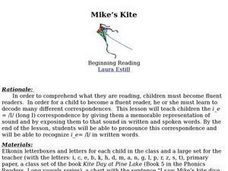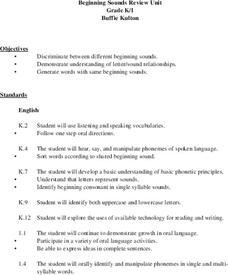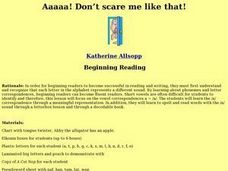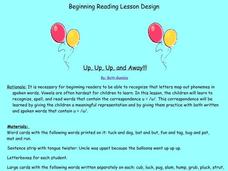Curated OER
The Big Pig
Students recognize the short vowel i in written and spoken language. Through matching activities, they discriminate the short vowel /i/ from other vowel sounds. Students associate the phoneme with its letter representation and identify...
Curated OER
Chuga, Chuga, Choo, Choo
Students identify the digraphs in written and spoken language. After a brief discussion on the combinations of letters that comprise digraphs, students practice identifying initial and final placement of the digraph /ch/ in words and...
Curated OER
The Squeaky Door
Young readers distinguish between the sounds for short vowel e and long vowel e. They are introduced to the vowel patterns that comprise long vowel sounds, with emphasis on /ea/. They practice reading and spelling a variety of words that...
Curated OER
Mike's Kite
Students explore the long /I/ sound as it is used in 'i_e' words. They recite a long /I/ tongue twister and use letterboxes to practice spelling 'i_e' words. In groups, they read a book with several long /I/ words and identify pictures...
Curated OER
Indians Are Coming!
Help your class increase their awareness of concepts related to reading and spelling. They identify the digraph /oa/ in spoken language and spelling. After a brief discussion, they read A Toad on the Road, listening for the target sound....
Curated OER
Beginning Sounds
Students are introduced to the different sounds that could be used at the beginning of words. After being shown words, they choose the one that has the same sound as the word their teacher said. Individually, they sort out picture...
Curated OER
Aaaa! Don't Scare Me Like That!
Learners practice saying each letter of the alphabet to determine the different sounds from each letter. As a class, they are given a tongue twister to practice making the "a" sound and spelling the words. To end the lesson, they...
Curated OER
Ohhhh Wheeee!!!!
Young scholars complete a variety of activities as they explore the long /E/ sound. They recite tongue twisters, practice writing words with the long /E/ sound (especially those using 'ee'), and read and identify long /E/ words in the...
Curated OER
Iiizzy is Iiicky Sticky!
Young scholars answer a series of questions about the different sounds that the letter I makes. They observe a picture about a girl and the letter I. They practice a tongue twister with the different sounds of I. They practice writing...
Curated OER
Here Comes the Choo Chooooooo!!
Young scholars practice exercising the phoneme/digraph that makes the /ch/ sound. They drill on the tongue twister, "Charles chatted while he waited on his chance to win a check," and encounter Elkonin boxes along with the book, "Chad...
Curated OER
It's Icky Icky Sticky
Learners recognize the short vowel i in written and spoken language. Through listening and matching activities, they discriminate the vowel sound /i/ from other phonemes. Students identify the phoneme and letter in pseudo words they decode.
Curated OER
Ike's Ice Cream is Icy
Students recognize the short vowel i in written and spoken language. Through matching and listening activities, they discriminate the short vowel /i/ from other phonemes. Students associate the phoneme with its letter representation and...
Curated OER
It's Icky Sticky
Students recognize the short vowel a in written and spoken language. Through matching and listening activities, they discriminate the vowel sound /a/ from other phonemes. Students identify the phoneme and letter in pseudo words they decode.
Curated OER
Up, Up and Away
Students recognize the short vowel u in written and spoken language. Through matching and listening activities, they discriminate the vowel sound /u/ from other phonemes. Students identify the phoneme and letter in words and pictures.
Curated OER
Scary Scary....aaaaa!!!
Students study the /a/ in both written and spoken word by reciting a tongue twister in which they exaggerate the /a/. Next, the make given words using letterboxes after the teacher models the technique, Next, they read "Pat's Jam" to a...
Curated OER
Fuzz Gets a Big Buzz
First graders recognize the short vowel u in written and spoken language. Through listening activities, they discriminate the vowel sound /u/ from other phonemes. Students identify the phoneme and letter in a decodeable story they read...
Curated OER
Allie The Alligator
Students recognize the short vowel a in written and spoken language. Through listening activities, they discriminate the vowel sound /a/ from other phonemes. Students associate the phoneme with its letter representation and identify them...
Curated OER
Quick, Quack, Quick Went The Duck
Young scholars practice recognizing the phonemes and diagraphs in letters that blend together to form the "ck" sound. They interact with the book, "Quick, Quack, Quick!" by Marsha Arnold and the phrase, "Jack the duck found an icky...
Curated OER
Literal Meaning of Reading
Students demonstrate literal meaning of a fiction book. In this reading comprehension lesson, students listen to the book, If You Give a Mouse a Muffin and practice the "m" sound during the read aloud. Students answer questions about the...
Curated OER
Icky Sticky Tin Man
Students recognize the short vowel i in written and spoken language. Through listening and matching activities, they discriminate the vowel sound /i/ from other phonemes. Students associate the phoneme with its letter representation and...
Curated OER
U-u-under The U-u-umbrella!
Young scholars practice using phonemes because they need to be able to recognize that phonemes and letters correspond with each other in order to become a proficient reader. The practice is done using the letter "u".
Curated OER
Opera Singer
Students recognize the short vowel o in written and spoken language. Through listening and decoding activities, they discriminate the vowel sound /o/ from other phonemes. Students identify the phoneme and letter in pseudo words they read.
Curated OER
O-O-O-O-O, I get it!
Students engage in an emergent literacy instructional activity that focuses on the skill of phonemic awareness. To practice the skill the phoneme for the letter "o" is used. The students need to recognize the letter and its corresponding...
Curated OER
Vowel Sounds - Short Aa Words
In this short "Aa" worksheet, 1st graders use the number code and find the letters for each number to spell out the small words. Students spell 20 words.

























